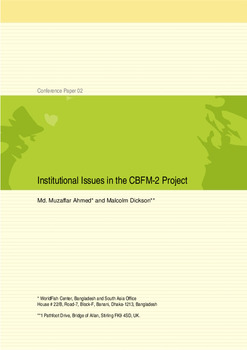Institutional issues in the CBFM-2 project
Abstract
A wide range of institutional arrangements were practiced in the Community Based Fisheries Management project in phase-1 (1994-1999) and phase-2 (2001-2007). The project documents stated that there were three main fisheries management approaches; fisher-led, community-led and women-led, however this fails to capture the full diversity of approaches adopted by 10 project partners (including DoF) during implementation. As a part of the institutionalization process, 130 CBOs were developed and established under the project as clear legal entities. In order to achieve sustainable management of the fisheries, efforts have been made towards linking these communitybased organizations (CBOs) and local institutions in CBFM-2 sites. Four regional CBO networking committees and a central committee were formed. The central committee is now being officially registered. Project partner NGOs were the main agencies involved in the CBO development process. To improve the likelihood of long-term CBO sustainability, plans have been prepared and are being implemented for project phase-out and post-project sustainability. Another important process was cluster management in CBFM. Overall, it can be concluded that the establishment of CBOs as local level institutions, cluster management and CBO networks made a positive contribution towards project implementation and should help to ensure that CBFM approaches are sustained

